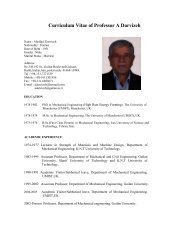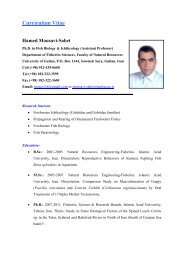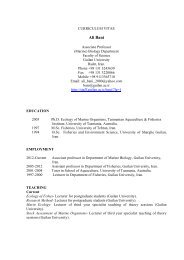Medical Tourism in Developing Countries
Medical Tourism in Developing Countries
Medical Tourism in Developing Countries
- No tags were found...
You also want an ePaper? Increase the reach of your titles
YUMPU automatically turns print PDFs into web optimized ePapers that Google loves.
54 ● <strong>Medical</strong> <strong>Tourism</strong> <strong>in</strong> Develop<strong>in</strong>g <strong>Countries</strong>In the United States there are 80 million baby boomers who are ag<strong>in</strong>g and,given their dispositions, will go to great lengths to reta<strong>in</strong> their health. Peoplewith discretionary <strong>in</strong>come liv<strong>in</strong>g <strong>in</strong> MDCs have the necessary prerequisiteto demand medical tourism. This demand is likely to grow s<strong>in</strong>ce the cohortwill grow. The population of the more developed countries is liv<strong>in</strong>g longeras life expectancies are steadily <strong>in</strong>ch<strong>in</strong>g upwards. People live <strong>in</strong> retirementfor longer and barr<strong>in</strong>g any policy changes <strong>in</strong> the retirement age, they arelikely to cont<strong>in</strong>ue to do so. When longevity and retirement are crossed, theresult is more travel, more medical care, and more medical tourism.The positive relationship between <strong>in</strong>come and tourism extends also tothe tourist’s country of orig<strong>in</strong>. Quantity of travel and <strong>in</strong>come per capitaare positively correlated with GNP (although not perfectly, because thepropensity to travel depends also on other factors 54 ) because travel requires<strong>in</strong>come <strong>in</strong> excess of subsistence, a condition more prevalent <strong>in</strong> high-<strong>in</strong>comecountries (<strong>in</strong>deed, more than 90 percent of world tourism orig<strong>in</strong>ates <strong>in</strong>MDCs 55 ). This has implications for medical tourism. The most affluent <strong>in</strong>Western countries still pay for their treatments close to home or travel tothe United States, Canada, and the UK; the most affluent <strong>in</strong> develop<strong>in</strong>gcountries are still will<strong>in</strong>g to pay a lot and travel to the United States andUK, or even Australia and S<strong>in</strong>gapore. It is the second tier of wealthypatients that travels to dest<strong>in</strong>ation LDCs with superior health care. Luxurymedic<strong>in</strong>e is also purchased by middle-<strong>in</strong>come populations from LDCs whocan’t afford to go to the West and have no medical care <strong>in</strong> their owncountries.TasteIn order to travel abroad for medical services, whether bypass surgery ortraditional heal<strong>in</strong>g, one has to like to travel. Some people simply do notlike fly<strong>in</strong>g, or disrupt<strong>in</strong>g their rout<strong>in</strong>e, or liv<strong>in</strong>g out of a suitcase. Despitewhat they have heard and read, they distrust LDC doctors and facilities.They want to be close to friends and family when hospitalized. By contrast,others are attracted to the exotic and they have an <strong>in</strong>cl<strong>in</strong>ation to travel, clearideas as to where they want to go, and what they want to do once they getthere. From the study of travel patterns and modes of travel<strong>in</strong>g by geographersand psychologists, and from economic analyses of tourist motivations,56 it is clear that variations <strong>in</strong> taste make travel very complex. Peoplewant to consume medical tourism because their taste makes them so<strong>in</strong>cl<strong>in</strong>ed. Several aspects of taste are relevant <strong>in</strong> this discussion.Some consumers desire privacy, and hav<strong>in</strong>g medical treatment abroad satisfiesthis need. They are not tracked <strong>in</strong> any way and if they choose to havea secret procedure, they are confident it will rema<strong>in</strong> so. Such a consumer can
















